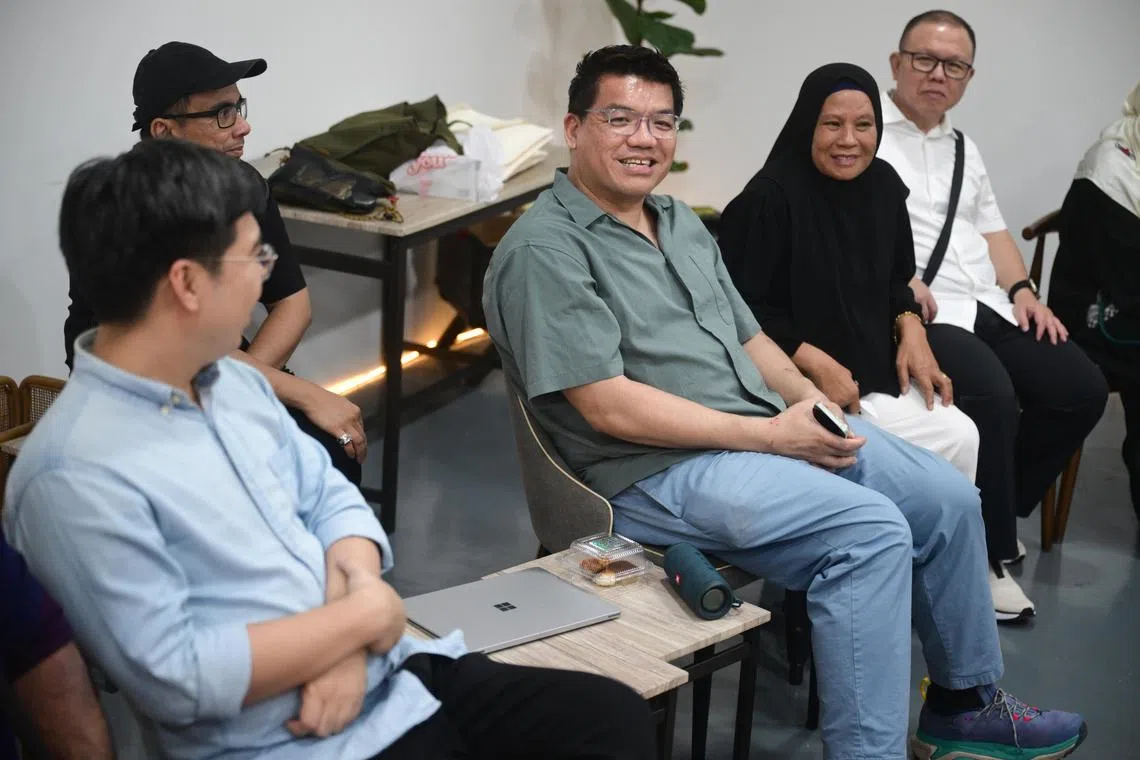Peer support programme goes beyond prison walls to help ex-inmates stay on the right path
Sign up now: Get ST's newsletters delivered to your inbox

Mr Andrew Joseph Ng (centre) at the programme’s fourth anniversary celebration on Feb 25 at florist Sing See Soon’s Garden Experiential Centre.
ST PHOTO: AZMI ATHNI
SINGAPORE – He had been on the inside as an inmate, sentenced to seven years’ imprisonment for drug trafficking.
But Mr Andrew Joseph Ng, who was released in 2023, said he could feel the anxiety while trying to assimilate after he returned to society a free man.
His stress came from not knowing things like QR codes or that cashless payments are now preferred over cash.
“I felt like the dumbest person on earth when a staff member at a cake shop asked me to make a cashless payment over the counter,” said Mr Ng, who was heavily involved in the development and design of the Empatherapy Programme in the Singapore Prison Service (SPS).
While his story of life after his release may sound trivial, the plight of other inmates who lack support or the know-how to handle issues such as family matters, finding a job or leaving past connections with gangs may result in recidivism.
The recidivism rate among inmates of drug rehabilitation centres (DRCs) within two years of release is at its highest since 2015.
SPS statistics released on Feb 11 show that the two-year recidivism rate of DRC inmates from the 2022 release cohort is 30.8 per cent.
This is higher than the overall rate of 21.3 per cent, which includes all local inmates who were detained, sentenced to jail, or given a day reporting order within two years of their release.
The overall two-year recidivism rate, which fell from 22 per cent the year before, remains low and stable.
“Some inmates are scared of going ‘out’ into the real world, and they need assurance that there is help out there through Empatherapy,” said Mr Ng.
On Feb 25, Empatherapy, a collaborative peer support movement for those who have been incarcerated to support one another, celebrated its fourth anniversary at florist Sing See Soon’s Garden Experiential Centre in Simei Lane.
At the event, former inmates, volunteers and staff of community partners such as Awful Grace and Facilitators Network of Singapore shared stories of hope and enlightenment that had taken place since the programme was launched in 2021 at Institution B1, the SPS’ maximum security prison.
A former inmate, who gave his name only as Mr Johan, said that the Empatherapy Programme, which he had attended in prison, had allowed him to open up and “unmask” himself without being judged.
Programme participants come from a diverse group of people – from social work professionals to prison officers and inmates.
“I didn’t think that with people who are more educated (than myself), I would have a chance of making my voice heard,” said Mr Johan, who continues to meet at least once a month with a circle of volunteers, former inmates and friends in a support group outside of prison.
“But we talk about everything, even though we have different perspectives.”
Empatherapy aims to foster a sense of community and understanding among inmates by having regular sessions where they are encouraged to express their thoughts and feelings.
It also provides a space for prison officers to engage and support the inmates, said SPS in an Instagram post.
In a recorded video clip aired at the event on Feb 25, Minister of State for Home Affairs Muhammad Faishal Ibrahim gave encouragement to the group, saying: “These are very important aspects of how we can navigate life, how we can go through rehabilitation and reintegration together.”
He said he was happy to see the growth in support for the Empatherapy Programme and in its number of participants.
To date, more than 200 people across all the prison institutions have taken part in the programme.
“It is really about community-building and relationships,” said Ms Karen Wong, a senior assistant director at SPS’ psychological and correctional rehabilitation division.
“We create that safety for them to then be able to trust one another, and that’s where the barriers break down between the staff and inmates, and that’s where relationships are also strengthened.”
But there was resistance from some inmates in the beginning.
“When we started, there were inmates who did not want to sit in a circle,” said Ms Wong. “They were not going to share with people they were uncomfortable with.”
But over time, barriers were lowered, and the hardened inmates eventually opened up, she said.
And what the inmates have learnt does not end with their release from incarceration.
“Over the past four years, we’ve seen the transformative power of Empatherapy, particularly in the community beyond the prison walls,” said Mr Ng.
He added: “We are heartened to see Empatherapy evolve to become a movement where different organisations can develop their own expression of Empatherapy to optimise its network and achieve the goal of a collaborative society, working earnestly to provide a global approach towards effective rehabilitation outcomes.”
Zaihan Mohamed Yusof is senior crime correspondent at The Straits Times.



